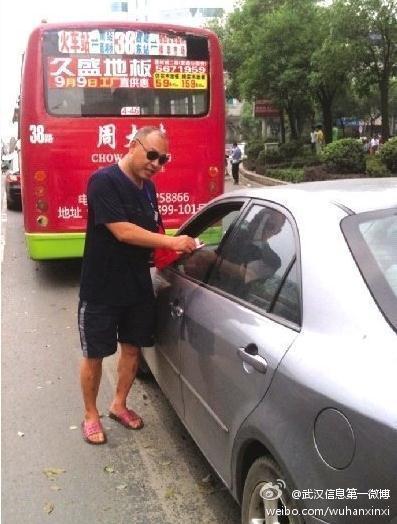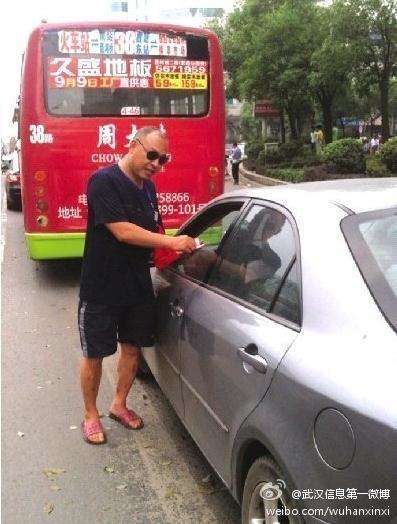A city in Hunan Province has embarked on an unusual scheme to raise money: employing large numbers of “sanitation inspectors,” many without identification or uniforms, to vigorously enforce traffic laws and thus plug a hole in the budget. Fine collectors get to keep 80 percent of their earnings.
After getting word of reports of men in plain clothes issuing fines to drivers at street intersections in Shaoyang City, Hunan Province, an investigation by the Xiaoxiang Morning Post revealed that they were actually city environmental sanitation inspectors, collecting fines for the local Bureau of Finance. That agency then gives the inspectors an 80 percent kickback.
But many of the fines are for trivial offenses, if they could be called traffic offenses at all.
A man surnamed Zhang driving in the Shaoyang area stopped at an intersection, waiting for the traffic light to turn green, according to a report by the Xiaoxiang Morning Post. Suddenly a man knocked on Zhang’s car window and demanded he pay a 10 yuan fine for stopping within the pedestrian crossing zone. Several people then rushed forward to surround the car. Because he was in a hurry, Zhang paid up.
Despite driving for five years, Zhang said, this was the first time he encountered an environmental sanitation inspector who fined drivers, noting that the man was not wearing a uniform.
The program is one of many that have cropped up across China, ranging from heavy fines on business owners for arbitrary infringements, to garnishing the wages of teachers, that local governments are using to prop up their finances.
When the Xiaoxiang Morning Post went to investigate, a man in plain clothes and sunglasses approached a car temporarily parked on the street, across the line of the pedestrian crossing, and was preparing to fine the driver. When the reporter approached him, he tried to walk away, but the reporter saw the work identification card on his shirt, identifying him as a “city environmental sanitation inspector” from the local neighborhood office. The man and others accompanying him were not wearing uniforms.
When the reporter located the traffic brigade with jurisdiction over that intersection, the person in charge said these city inspectors are not associated with the brigade. When asked if they had authority to fine drivers, the person said the reporter should go to the city’s Urban Administrative and Law Enforcement Bureau or the neighborhood office.
The office confirmed that the people issuing traffic tickets were indeed environmental sanitation inspectors.
At the Shaoyang Urban Administrative and Law Enforcement Bureau, a staff member told the reporter that the city had hired 1,000 such inspectors. They began working on Aug. 1 and several hundred were dispatched to each district.
The staff worker also provided a copy of the inspectors’ law enforcement manual, which states “all fines and parking fees collected by the inspector should be turned over to the district Bureau of Finance. The Bureau of Finance will then settle the amount according to the receipts. Eighty percent will be returned as a reward to the inspector himself.”
A staff worker at the legal section of the Urban Administrative and Law Enforcement Bureau informed the reporter that the bureau has entrusted the enforcement of traffic laws to the environmental sanitation inspectors.
However, a Hunan-based lawyer told the Xiaoxiang Morning Post that these inspectors do not have the authority to enforce laws. They cannot issue penalties; they can only try to persuade citizens not to engage in illegal activities. In addition, the fines should be given to the state treasury, not appropriated by the bureau. The lawyer also confirmed that it is illegal to return 80 percent of the fines as wages to the inspectors.
Read the original Chinese article.
The Epoch Times publishes in 35 countries and in 19 languages. Subscribe to our e-newsletter.






